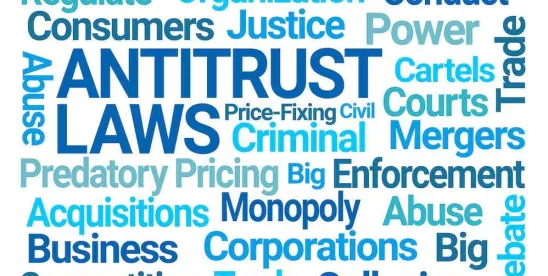The US Department of Justice Antitrust Division (DOJ) continues to send strong warnings to companies sharing information outside of their organizations, including through third-party reporting services or pricing software, that such exchanges will be closely scrutinized and may be prosecuted as stand-alone violations of the US antitrust laws if they tend to harm competition. Last week, DOJ filed a statement of interest (Statement) in a multidistrict litigation where it took the position that:
- “(1) information sharing alone can violate [antitrust law], even without proof of an agreement to fix prices; and
- (2) information exchanges that report only aggregated data can violate the antitrust laws, even where the information is not linked to specific competitors.”
The Statement offers insight into how DOJ is viewing and analyzing information exchanges, but also serves as another reminder that information exchanges pose a greater risk than ever before and warrant close review.
Background: Increased Scrutiny of Information Sharing
DOJ has taken an increasingly aggressive approach towards information exchanges over the past few years. In early 2023, DOJ withdrew from an almost 30 year-old policy statement that had formed a backbone of principles upon which the business and legal community relied on as the rules of the road for information sharing. In withdrawing from the prior policy, DOJ declined to replace it with an updated policy, instead saying that it would analyze information exchanges on a case-by-case basis and advising companies and lawyers to turn to DOJ speeches, enforcement proceedings, and amicus briefs for guidance.
Since its withdrawal, DOJ has continued to signal that it is closely scrutinizing exchanges of competitively sensitive information between entities, particularly competitors, as well as companies’ use of pricing algorithms and other artificial intelligence (AI) technology that assists companies in predicting competitors’ strategies and decision-making, particularly when those algorithms and AI rely on data collected from competitors. DOJ is also currently litigating two civil cases challenging information sharing agreements: (1) United States v. Agri Stats, Inc., No. 0:23-cv-3009-JRT-JFD (D. Minn. filed Sept. 28, 2023), a bench-marking case where DOJ accuses Agri Stats of violating antitrust law by helping meat processors exchange competitively sensitive information about production levels, costs, and pricing; and (2) United States v. RealPage, Inc., No. 1:24-cv-00710 (M.D.N.C. filed Aug. 23, 2024), a pricing-algorithm case where DOJ accuses software provider RealPage of violating antitrust law by facilitating an agreement among competing landlords to share competitively sensitive information through joint use of RealPage’s revenue management software.
Key Points from the Statement
DOJ’s Statement highlights three key points that businesses and counsel advising them should take note of when assessing the antitrust risks posed by an information exchange.
Information Exchange Satisfies the Concerted-Action Element of Section 1
DOJ takes the position that information exchange among competitors may not only “support an inference that a price-fixing or output-restriction agreement exists” but also “is itself a form of concerted action that can violate the antitrust laws.” According to DOJ, this “includes any information-sharing arrangements run by a third-party reporting service … in which participants agree to share their information with the third party.”
Courts regularly allow plaintiffs to rely on information exchange as a piece of evidence to suggest the existence of an agreement to fix prices or reduce output. But the position that sharing competitively sensitive information alone can be enough to violate antitrust law is an expansion of the types of conduct that could run afoul of the antitrust laws.
Information Sharing Is “Unreasonable” Under Section 1 if It Tends to Harm Competition
DOJ takes the position that “[w]hereas price-fixing agreements (including those inferred from information-sharing evidence) are unreasonable per se [e.g., automatically condemned as a violation of antitrust law], standalone information-sharing claims are subject to a flexible rule-of-reason analysis, which requires a fact-specific inquiry in each case” that considers all of the facts and circumstances to determine whether the restraint tends to harm competition.
While DOJ acknowledged that the rule-of-reason framework considers procompetitive justifications for an exchange and weighs those justifications against the exchange’s anticompetitive effects, DOJ did not provide examples of any procompetitive justifications that might outweigh even potential anticompetitive harm. DOJ focused instead on the broad and subjective harm to competition, stating that “competitors’ information sharing can undermine the competitive process; increase coordination among rivals; and cause an asymmetry of power in the market.”
Whether an Information Exchange Tends to Harm Competition Is a Fact-Specific Inquiry, With No Single Factor Being Dispositive
DOJ highlighted certain factors that are considered when assessing whether an information exchange among competitors tends to harm competition—but argues that “no factor is dispositive” and makes clear that, in DOJ’s view, there are no safe harbors or bright-line rules in terms of the structure, nature, and manner of the exchange.
Sensitivity of the Information Exchanged
“The more sensitive the information, the more it can be used to restrain competition.” Price, output, and cost information, and information that reflects recent, current, or future price or output, is among the most competitively sensitive and carries the highest risk, “[b]ut not every case requires a direct exchange of price or cost,” and other types of information can still raise concerns.
Granularity of Information Exchanged
When the information is detailed or nonaggregated, the exchange is “more likely to harm competition,” but “there is no categorical rule,” and “[c]ourts do not require detailed or nonaggregated information if other circumstances indicate a tendency for anticompetitive harm.” DOJ pointed to examples of aggregated data exchanges, which allowed firms to “glean information about the competitors’ budget plans and to coordinate their salaries in response” and polls reporting back the mean, median, and mode minimum rates that physicians would accept from payors, which helped encourage members on the low end to raise their minimum rates.
Public Availability of Information Exchanged
“[W]hen competitors agree to exchange competitively sensitive information only among each other, it suggests that the information sharing will benefit only the competitors at the expense of consumers, workers, or other market participants.”
Contemporariness of Information Exchanged
“Exchanges of recent or future information carry far greater potential for anticompetitive effects than historical data.”
Structure of the Industry Involved
Information exchanges in highly concentrated markets may increase the risk of anticompetitive effects, but “not every case must involve only a handful of competitors.”
Practical Guidance
Companies and counsel should expect DOJ to continue to closely scrutinize exchanges of competitively sensitive information between separate entities and companies’ use of pricing algorithms and other AI technology that assists companies in predicting competitors’ strategies and decision-making, particularly when those algorithms and AI rely on data and information collected from competitors. The following steps can assist companies in assessing and mitigating their antitrust risk.
- Carefully review all current and contemplated information exchanges to determine: (1) whether the exchange is reasonably necessary to achieve a legitimate business purpose; (2) whether the exchange has any actual or potential anticompetitive effects; and (3) whether the exchange is structured in a way to reduce antitrust risk.
- Companies should exercise extreme caution when developing or using algorithms that rely on competitors’ nonpublic data to determine prices, production levels and output, employee compensation, etc.
- It is always best practice to consult antitrust counsel prior to exchanging competitively sensitive information outside of your organization. Antitrust counsel can assist in assessing the risks of such exchanges and provide guidance on additional safeguards that may assist in mitigating those risks.
- Implement internal compliance procedures to ensure current or contemplated information exchanges are flagged and reviewed by counsel before they occur and are subject to periodic review to confirm accuracy and adherence to any recommended safeguards.
- Review and update antitrust compliance policies and training so that employees across all departments (e.g., sales, marketing, operations, engineering, IT, product development, etc.) are aware of the ways in which exchanging information outside the company can create antitrust risks.




 />i
/>i

